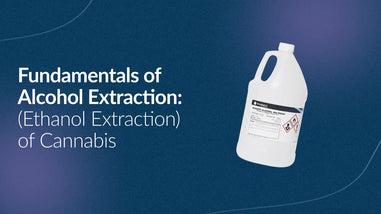- No products in the cart.
Handling nitric acid comes with significant safety risks, including inhalation of its dangerous fumes and potential splashes on the skin or clothing. Knowing the proper procedures for safely handling nitric acid is key to preventing these accidents and ensuring a safe working environment.
Nitric acid can cause severe skin and eye irritations, so if handling it, you'll want to make sure your employees know the correct safety measures for handling it. Wear protective gloves, eye protection, face masks and clothing when handling nitric acid. Proper ventilation should be installed in the workplace to eliminate potential fumes from nitric acid exposure. Use airtight containers for storing nitric acid and ensure that the area of use is properly identified and labeled. Employees should also be provided with regular training about the hazardous properties of nitric acid, as well as safe storage practices and disposal procedures.
Familiarize Yourself with Nitric Acid Hazards
Nitric acid is a highly corrosive substance, which means it can cause serious damage to your skin and clothing if it touches them. Additionally, nitric acid fumes can be hazardous to the lungs if inhaled and can even cause blindness if they come into contact with the eyes. It's essential to understand these risks before handling nitric acid in order to take adequate safety precautions.Check Your Local Regulations
Before handling nitric acid, make sure to check the local jurisdiction's specific regulations for storage and use. National, state, county and municipal governments all have their own laws that may apply to your workplace. Knowing these regulations will help you set up a safe environment in which to handle nitric acid and ensure you're in compliance with all applicable laws.Nitric acid can cause severe skin and eye irritations, so if handling it, you'll want to make sure your employees know the correct safety measures for handling it. Wear protective gloves, eye protection, face masks and clothing when handling nitric acid. Proper ventilation should be installed in the workplace to eliminate potential fumes from nitric acid exposure. Use airtight containers for storing nitric acid and ensure that the area of use is properly identified and labeled. Employees should also be provided with regular training about the hazardous properties of nitric acid, as well as safe storage practices and disposal procedures.
Wear Proper Safety Equipment
Handling nitric acid requires proper safety equipment to protect both your skin and eyes from exposure. Be sure to wear:
- Protective eyewear
- Chemical-resistant gloves
- Lab coat or coveralls
- Closed-toe shoes with non-slip soles.
Make sure any porous clothing is covered with a solid fabric barrier like vinyl or rubber to prevent the acid from seeping into your clothing or skin.
Choose protective eyewear that is designed for use with acid, specifically ones with anti-fogging capabilities. If you are splashing acid into the eyes, safety goggles may be a better choice because they will fit snugly and form a seal around your eyes to help keep out any contact. As with any chemical, it is important to know the potential risks associated with handling nitric acid, so make sure you are aware of the hazards and wear appropriate protective clothing and equipment when dealing with it.
Know How to Handle Spills Safely and Effectively
In the event of an accidental spill, know the recommended steps to handle it in a safe and effective manner. Make sure you have appropriate materials on-hand such as sawdust, soda ash, a plastic shovel and scoop, and paper towels. Begin by containing the spill with absorbent materials such as sand or sawdust and put some water over it to dilute the Nitric Acid. Once you've contained the spilled acid, dispose of it according to your local regulations or contact a hazardous waste disposal company for assistance.
When handling Nitric Acid, always wear Personal Protective Equipment (PPE) such as:
- Acid-resistant and puncture-resistant gloves
- Eye protection
- Face shields
- Full face respirator .
Additionally, ensure you have adequate ventilation while working with the acid. If nitric acid is overheated or spilled on hot surfaces it can generate hazardous fumes so it's best to cool down equipment before proceeding with cleanup of the spill. It's also important to check the pH level of your solution before and after each usage as acids like nitric acid can decrease pH significantly if not handled properly.
Properly Store Nitric Acid in an Appropriate Container
As is the case with any hazardous material, its important to store Nitric Acid in an appropriate container. Being that this acid can easily etch glass and plastic it's best to use an HDPE or Teflon-lined container for long-term storage. A secondary containment such as a tray can also be used for extra protection.
Nitric Acid is highly corrosive, presenting serious health risks. Handling nitric acid can cause severe skin and eye burns when it comes into contact with skin or the eyes and can damage your respiratory system if inhaled. When using nitric acid it's important to always wear eye protective gear, gloves and lab coats. Additionally, make sure to utilize an adequate amount of ventilation in order to reduce the risk of fumes entering the work environment. Regularly check on material stored for signs of deterioration, such as leaks and pitting on containers, as well as checking for other irregularities to ensure safety.
Where Can You Purchase Nitric Acid For Lab and Industrial Use?
Nitric acid can be obtained from most chemical supply stores either in-person or online such as Lab Pro Inc. As with all hazardous materials, precaution must be taken when handling and storing nitric acid. When buying from a licensed professional, make sure to ask about the safety measures that need to be taken when using this substance. Always read and understand the Material Safety Data Sheet before picking up any chemicals, as it contains information on its safe use, storage, transportation, and disposal.
About Lab Pro
For over 40 years, Lab Pro Inc. has been committed to delivering the highest quality chemicals for research such as nitric acid, hand tools, cleaners, lab equipment, distance learning kits, lab supplies, and cleanroom PPE apparel to medical device companies and laboratories worldwide. To learn more contact us online or at 888-452-2776.












































